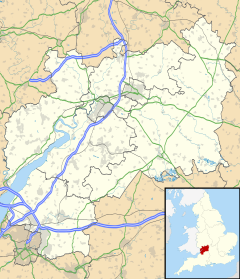Beachley
| Beachley | |
|---|---|
 Old ferry terminal and inn at Beachley, seen from the Severn Bridge |
|
| Beachley shown within Gloucestershire | |
| OS grid reference | ST551910 |
| District | |
| Shire county | |
| Region | |
| Country | England |
| Sovereign state | United Kingdom |
| Post town | CHEPSTOW |
| Postcode district | NP16 |
| Dialling code | 01291 |
| Police | Gloucestershire |
| Fire | Gloucestershire |
| Ambulance | South Western |
| EU Parliament | South West England |
| UK Parliament | |
Beachley is a village in Gloucestershire, England, near the border with Wales. It is located on a peninsula at the confluence of the rivers Wye and Severn, where the Severn Bridge ends and the smaller secondary bridge for the River Wye begins, both bridges carrying the M48 motorway between England and Wales though the motorway is not directly accessible from the village. The tidal range on this stretch of water is the highest in the UK. Before the construction of the bridge it was a ferry port from where the Aust Ferry operated until 1966.
Before the 9th century, the Beachley peninsula and the mouth of the Wye were part of the Welsh kingdom of Gwent. A small chapel was founded at what was then the southernmost point of the peninsula - now a tidal island known as Chapel Rock - traditionally in the 4th century by Tecla, a princess of Gwynedd who retired there as a hermit before being murdered by raiders from the sea. A chapel dedicated to St Twrog, perhaps containing a navigation light, was later built on the rock but was ruined before the 18th century.
Offa's Dyke, built by the Mercians in the 8th century, cuts off the peninsula to the north. In 956, Beachley was part of lands granted by King Edwy to Bath Abbey. According to historians interpreting the writings of Walter Map, it is likely that Beachley was the site of an unprecedented meeting around 1056 between the unchallenged ruler of Wales, Gruffydd ap Llywelyn, and the king of England, Edward the Confessor, to establish each one's areas of control.
...
Wikipedia

